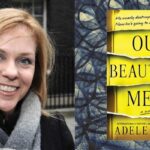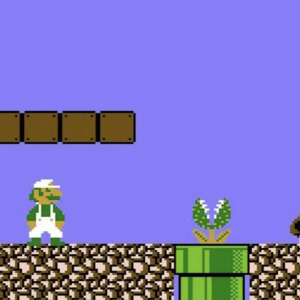
Shanthi Sekaran Returns to Haunt Her Childhood Library
Ghosts on the Shelves, and Memories in Hand
I remember my childhood library as a split-level affair, the children’s section a shallow well, carpeted, ready for the sprawl of young limbs, for storytimes and song circles. The walls were yellow, the carpet gray. Heavy wooden chandeliers hung from the ceiling and sprouted globes of light. Or maybe they didn’t. Maybe the chandeliers were from another library. Maybe I’ve created a patchwork of libraries past. Maybe the walls were green.
What I do remember is sneaking out of the children’s section, to the furthest reaches of non-fiction. I must have been eight or nine at the time. There was a book I’d search out every week. It sat on the second shelf at the very back of the building. I have no idea how I found it in the first place, or what might have brought me to that part of the library. A game of hide and seek? Into the Unknown, it was called, a sparsely printed black-and-white catalogue of hauntings, ghosts and poltergeists. I remember the cover of the book: pale gray with a silvery flock pattern, like the wallpaper of an old house. I remember flipping through the pages, allowing myself peeks at the pictures inside: a blur of light by a stairway, a blur of light by a china cabinet, pale-eyed Edwardian children, and a shadowy face captured, inexplicably, peering out of a mirror. Libraries are quiet places, but the building fell into utter silence whenever I opened that book. I heard the whistle of air through my nose, the hush of a finger passing over paper. Nothing else.
They couldn’t be looked at too closely, those pages. Reading the words might have invited the ghosts from their English manor houses and into my safe and new, my Californian and specter-free world. It was enough to flip furtively through, glancing at photographs, bypassing the print, with the thought that the book would always be there, should I ever want to actually read it. And like a faithful old spirit, it always was. The images would follow me home, from day into night. They would send me running from the kitchen to my bedroom in the evenings, afraid that if I stood still and looked around, I’d catch my own blur of light, lurking by a mirror, waiting in the dark and unfathomable corners of my childhood home.
And now, I’ve returned. I’m 39. It’s a Wednesday afternoon. My childhood library occupies a healthy wedge of land on Watt Avenue, a few doors down from a Rite Aid and the Chung King Chinese Buffet. It’s a rotund, wood-shingled building, almost motherly in its shape and scope, a comfort in a desert of concrete and vinyl siding. Patrons trickle in and out of the front doors. I park. I’ve never been here as an adult, and walking through the door, I feel almost unqualified. I half expect a librarian to stop me and ask where my mother is, but nobody does. What does greet me is a rush of sweet fog—cedar, carpet, musty paper. The smell of time’s passage, the smell of love.
I’m not a sentimentalist. I push happily forward through life. But stepping through the library doors, I can’t quite describe what I feel. All I’ve come up with is a jumble of words that putter around the real feeling: safety, embrace, possibility, precision. Clear plastic covers that crinkle when touched, the gentle thud of a book on a checkout sensor. Wrapped around all this is a distant sort of longing, a need to take this library and cram it against my eyes, my ears, to smell its smell until I’ve taken it, all of it, into myself.
The children’s section isn’t split-level anymore. Maybe it never was. When I walk to the end of the non-fiction section and kneel before the second shelf, I don’t find my ghost book. Later that day, I will google famous ghosts, and I will see them again, this time with names and full descriptions. I read their histories. The Brown Lady, Resurrection Mary, the Ghost of Clifton Hall. I realize that for five years, I lived a mile away from Clifton Hall.
It’s 2016 and I’m a mother in America. Ghosts don’t scare me—the living do. The older I become, the more I move from one life to the next, the more people I lose and romances I forget, the more fervently I hope that ghosts are real. A ghost is a memory stamped onto the present. A book is a memory spun into a cocoon of thought and image and individual impulse. Books and ghosts make me feel safe. I find comfort in the thought that when people disappear, they don’t always leave.
Memory has a smell. It’s the smell of old paper.
Now, when I take my two boys to the library in our own town, they head straight for the computers. I always stop them. I make them look at the books first. One day, maybe, if I do my job and they grow to love reading, they’ll return to their own childhood library and find a book they used to love. They’ll look for it, and most likely it will be gone. So many things, at some point in their lives, will be gone. I see my sons, grown into men, sadder from life, and stronger. Their mother gone, a lifetime away. But that’s just me, frothing my melancholy.
For now, one boy is three years old and one boy is eight, and they bound from shelf to shelf, picking rapidly, arbitrarily, never second-guessing themselves. Avi, the eight year old, chooses a comic, a fantasy adventure, a Horrible History, and a book about Frankenstein. Ash is slower and more selective: a book on touchy-feely fire engines, and a mystery. The second is a chapter book, not meant for a three-year-old, but I let him take it. For my two boys, books have nothing to do with memory. For two boys with chocolate muffin stains on their cheeks, books are the present. Books aren’t ghosts. Books are friends. Books are light and play and impulse. Books will always be there, ready to be taken up or placed aside, subject to a child’s passing whims. The boys dart from the bookshelves back to the computer screens, where they will click on alphabet games, watch monkeys swing from digital vines, plunging into color and light, the dizzying flash of the present. I will let them click and tap and click and tap, and then we’ll go home, a stack of books in hand. That night, the buzz and ping of computer games will recede, the city streets will be dark and quiet. They’ll settle into bed and I will open a book and read to them. Avi will fade quickly into sleep, as he always has. Ash, the baby, never wants to miss out. He’ll stay up through one book and another. He’ll stay up long past book time, always ready for more.
When I finish reading, we sit together in the wordless dark. I am in my child’s room, in a house with my name on the mortgage. But for those few minutes, the echo of a story receding into the night, the walls of the house dissolve. I could be back home, a child again in a house full of dark corners and endless, pitch-black corridors, thinking of a book on a shelf in a library. My father could be sitting next to me, his own words trailing into silence. The dark erases the lines between past and present, living and dead. I am child and mother, reader and audience, haunter and haunted. And in a library, not far away, half a block down from a Chinese buffet, a book waits, its pages stamped with memories, quivers of light, seared with longing, hovering on stairways, gazing out of mirrors, waiting.
Lucky Boy, Shanthi Sekaran’s new novel, is available now from Putnam.
Shanthi Sekaran
Shanthi Sekaran teaches creative writing at California College of the Arts, and is a member of the Portuguese Artists Colony and the San Francisco Writers’ Grotto. Her work has appeared in Best New American Voices and Canteen, and online at Zyzzyva and Mutha Magazine. Her first novel, The Prayer Room, was published by MacAdam Cage. A California native, she lives in Berkeley with her husband and two children.



















